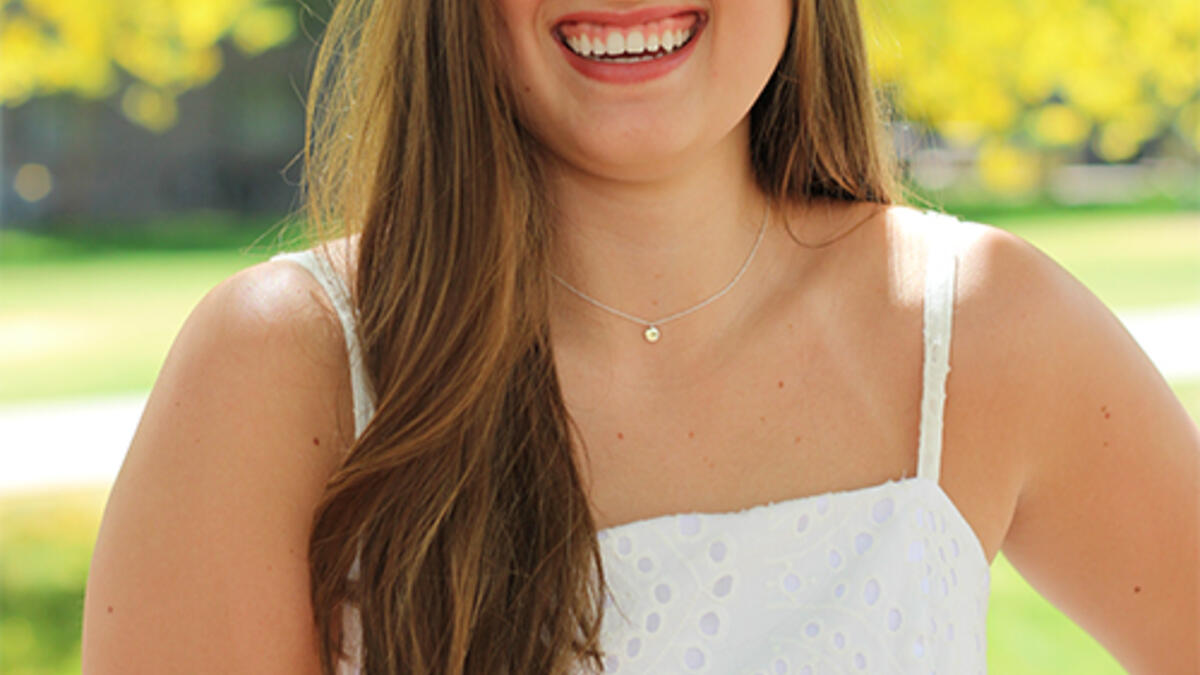ASU grad carries on her mother’s legacy of working with children

Photo courtesy of Cate Marken
Editor's note: This story is part of a series of profiles of notable spring 2021 graduates.
Growing up in a small town in Washington, Cate Marken knew from a very young age she wanted to make a difference in her rural community. Her mother, a second grade teacher, instilled in her a love of learning and showed her how to serve others daily.
With the help of several scholarships — including the Brandon Scott Koetje Memorial Scholarship from her hometown, the New American University Scholarship, and the Dean’s Circle Scholarship— this small-town girl was ready for a move to a much bigger city.
The lead community assistant in Barrett, The Honors College, Marken will graduate this spring with a dual major in medical microbiology and family and human development. She plans to attend a medical school that offers a dual program with a master’s degree in public health, ultimately becoming a pediatrician and doing research that will benefit rural areas like her hometown.
Marken acquired her love of research at ASU. “I’ve had the privilege to work with Sarah Lindstrom-Johnson for the past two years,” she said. “I started out as just a microbiology student. I thought that research would only be sitting in a lab with your goggles and test tubes, but she showed me a whole other side of research that is working with people, which is what I love doing.”
She often had a front row seat in witnessing the efforts her mother and other teachers made in their community by sharing ideas on how to impact students’ lives. She hopes to carry on her mother’s legacy in working with children in her own way, by helping them become their best selves.
“One person can make a huge impact on (kids) just by caring. Caring can get them the community resources available to help them change direction.”
Marken shared more about her experience at ASU.
Question: What was your “aha” moment, when you realized you wanted to study the field you majored in?
Answer: When I was in sixth grade, Paul Tough wrote an article for The New Yorker called “The Poverty Clinic” about Dr. Nadine Burke-Harris and adverse childhood experiences. Fast forward to my first year of college and I took human development as an elective. As soon as I heard our professor utter the words “adverse childhood experiences,” I knew I was in the right place, and that day I added family and human development as a double major.
Q: What’s something you learned while at ASU — in the classroom or otherwise — that surprised you or changed your perspective?
A: The best lesson I got from my time at ASU is that it’s OK to lean on other people when you’re struggling. I thought I constantly had to be an academic powerhouse to get by, but after all of my personal struggles, I started realizing I could be so much happier — and more successful — if I let friends, family and colleagues support me through challenges. Overall, I think that boils down to letting yourself be vulnerable with the people who love you.
Q: Why did you choose ASU?
A: At first it was because I wanted to be in a big city. Moving into the dorms and starting classes let me realize going to school out-of-state was a chance to become independent and learn about myself after being raised in such a small town.
Q: Which professor taught you the most important lesson while at ASU?
A: During my thesis this year, Dr. Lindstrom-Johnson made a great point that the work I do now won’t be the best I ever do, because I have a lifetime of learning ahead of me to improve as a scientist.
Q: What’s the best piece of advice you’d give to those still in school?
A: My best advice would be not to judge yourself too harshly. College is the time to learn our strengths and weaknesses, and failure is a natural part of that experience. Giving yourself some grace is always a good choice.
Q: What was your favorite spot on campus, whether for studying, meeting friends or just thinking about life?
A: I love the Academic Court in the Barrett Complex. Especially for the sake of social distancing, I always have a great time sitting in the grass with my friends to catch up or do homework.
Q: What are your plans after graduation?
A: I’m headed out to some of the national parks around the Southwest to take a breather with my friends, then I’ll be working as a medical assistant and studying for the MCAT. I’m excited to take everything I’ve learned over the last four years and put that into clinical experience.
Q: If someone gave you $40 million to solve one problem on our planet, what would you tackle?
A: One of the issues I’d love to tackle is getting doctors and health care professionals into rural areas of the country. Our national physician shortage has negatively impacted the people who need high-quality care the most, and putting $40 million dollars into training pediatricians and family doctors would go a long way. Needless to say, the highest quality training we can provide for new doctors includes learning about their own biases and adapting their practices to a wide variety of cultural backgrounds.
More Science and technology

ASU at the heart of the state's revitalized microelectronics industry
A stronger local economy, more reliable technology, and a future where our computers and devices do the impossible: that’s the…

Breakthrough copper alloy achieves unprecedented high-temperature performance
A team of researchers from Arizona State University, the U.S. Army Research Laboratory, Lehigh University and Louisiana State…

4 ASU researchers named senior members of the National Academy of Inventors
The National Academy of Inventors recently named four Arizona State University researchers as senior members to the prestigious…

